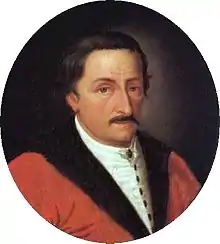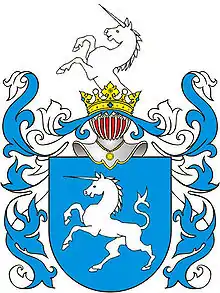Andrzej Maksymilian Fredro
Andrzej Maksymilian Fredro (1620–15 June 1679) was a Polish szlachcic and writer.
Andrzej Maksymilian Fredro | |
|---|---|
 | |
| Coat of arms | Boncza |
| Born | 1620 Przemyśl land |
| Died | June 15, 1679 Przemyśl |
| Family | House of Fredro |
He was born in 1620.[1] Fredro studied at the Cracow Academy.[1]
He was castellan of Lwów from 1654 and voivode of the Podolian Voivodeship from 1676. He was Marshal of the Sejm (zwyczajny) from January 26 – March 11, 1652, in Warsaw. At that sejm Władysław Siciński used liberum veto for the first time. Fredro fortified Przemyśl in 1658-1660.[1]
He died on 15 June 1679.[2] In his political writing, Fredro argues that liberum veto is necessary for a republic as big as the Polish–Lithuanian Commonwealth. When one region of the Commonwealth falls into crisis, nobles from other regions may not be fully aware of the danger. Decision by majority in the Sejm is dangerous for such a big republic, because it enables the majority to ignore the interests of a particular region which has gotten into difficulty and asks the nation for help.[3]
He was married to Katarzyna Gidzińska.[2]
Works
- Gestorum Populi Poloni sub Henrico Valesio (1652)
- Przysłowia mów potocznych (1658)
- Scriptorum seu togae et belli notationum fragmenta (1660)
- Monita politicomoralia (1664)
- Militarium seu axiomatum belli (1668)
- Epistola ad amicum (1669)
- Vir Consilii (1730, released after his death)
Further reading
- Władysław Czapliński, Fredro Andrzej Maksymilian [in:] Polski Słownik Biograficzny, vol. VII, p. 114.

References
- Przyboś, Kazimierz (1997). "Fredrowie herbu Bończa domus antiqui moris virtutrisque cultrix" (PDF). Rocznik Polskie Towarzystwa Historycznego. Seria Nova. 3 (14): 99.
- Przyboś, Kazimierz (1997). "Fredrowie herbu Bończa domus antiqui moris virtutrisque cultrix" (PDF). Rocznik Polskie Towarzystwa Historycznego. Seria Nova. 3 (14): 100.
- Z. Ogonowski: Nad pismami A.M. Fredry w obronie liberum veto.. In: Z. Ogonowski: Filozofia polityczna w Polsce XVII wieku i tradycje demokracji europejskiej. Warszawa 1992, p. 26.